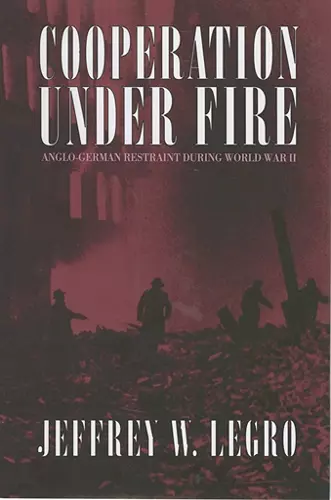Cooperation Under Fire
Anglo-German Restraint During World War II
Format:Paperback
Publisher:Cornell University Press
Published:12th Sep '13
Currently unavailable, and unfortunately no date known when it will be back

Why do nations cooperate even as they try to destroy each other? Jeffrey Legro explores this question in the context of World War II, the "total" war that in fact wasn't. During the war, combatant states attempted to sustain agreements limiting the use of three forms of combat considered barbarous—submarine attacks against civilian ships, strategic bombing of civilian targets, and chemical warfare. Looking at how these restraints worked or failed to work between such fierce enemies as Hitler's Third Reich and Churchill's Britain, Legro offers a new understanding of the dynamics of World War II and the sources of international cooperation.
While traditional explanations of cooperation focus on the relations between actors, Cooperation under Fire examines what warring nations seek and why they seek it—the "preference formation" that undergirds international interaction. Scholars and statesmen debate whether it is the balance of power or the influence of international norms that most directly shapes foreign policy goals. Critically assessing both explanations, Legro argues that it was, rather, the organizational cultures of military bureaucracies—their beliefs and customs in waging war—that decided national priorities for limiting the use of force in World War II.
Drawing on documents from Germany, Britain, the United States, and the former Soviet Union, Legro provides a compelling account of how military cultures molded state preferences and affected the success of cooperation. In its clear and cogent analysis, this book has significant implications for the theory and practice of international relations.
In this impressive book, Legro argues that major strategic turning points are not simply the result of shifts in power and interests; they also involve the interplay of 'collective ideas' within states about how to relate to the outside world.... Legro reflects on the future on the Bush 'revolution' and argues that, absent further terrorist attacks, U.S. foreign policy is likely to tack back to the post-World War II mainstream.
(Foreign Affairs)Legro's careful, insightful, and intriguing study shows that military preferences have a powerful influence on state policy during war. Whose preferences matter for state policy, and the origins of those preferences, remain the challenges presented by this important book.
(American Political Science Review)This is a well-written and extensively researched analysis of three kinds of restraints observed for part or all of World War II. These restraints concerned the use of submarines against merchantmen, the bombing of cities from the air, and (more enduringly) the use of poison gas. Such restraints have not been much remembered or analyzed, as survivors and scholars alike tend to remember World War II as the most unrestrained martial conflict in all history.
(SociISBN: 9780801479045
Dimensions: 235mm x 155mm x 19mm
Weight: 454g
272 pages